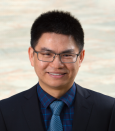讲座题目: Thermoelectric materials and devices for sustainable energy and refrigeration
讲座地点:工学三号馆208学术报告厅
讲座时间:2023年5月24日9:30-12:00(A.M)
主讲嘉宾:陈志刚教授
Owing to their capabilities of solid-state conversion between heat and electricity, zero emission, and high flexibility, thermoelectric devices and materials have exhibited great application potential for power generation and localized refrigeration. Here, we timely summarize the progress on the up-to-the-date thermoelectric devices and materials with their unique designs. In this work, we carefully summarize the structure-related principles and factors that determine the performance of thermoelectric devices and propose strategies for improving their utilities. Besides, we focus on the timeliest designs for inorganic-based devices, organic-based devices, and hybrid-based devices targeting for both power generation and refrigeration. In the end, we point out the current challenges, controversies, and prospects of thermoelectric devices.
Bio
 Zhi-Gang Chen is currently a Capacity Building Professor of Energy Materials and ARC Future Fellow in Queensland University of Technology (QUT). He received his Ph.D in materials science and engineering from the Institute of Metal Research, Chinese Academy of Science, in 2008. His research concentrates on smart functional materials for thermoelectrics and nanoelectronics from synthesizing materials to understanding their underlying physics and chemistry. As a lead Chief Investigator, Prof. Chen has successfully won 6 ARC Discovery grants, 1 ARC Research Hub, 4 ARC Linkage grants, 4 ARC LIEF grants, 2 CRC-P grants, and industry investment with 20MA$. Prof. Chen contributes > 380 peer-reviewed publications (including 6 hot papers and 40 highly cited papers since published), 4 patents, and over 40 plenary/keynote/invited talks. His publications have been cited >26,500 times (Scopus) with H index of 87. He is a Clarivate & Web of Science highly cited researcher and a Mendeley global top 2% researcher.
Zhi-Gang Chen is currently a Capacity Building Professor of Energy Materials and ARC Future Fellow in Queensland University of Technology (QUT). He received his Ph.D in materials science and engineering from the Institute of Metal Research, Chinese Academy of Science, in 2008. His research concentrates on smart functional materials for thermoelectrics and nanoelectronics from synthesizing materials to understanding their underlying physics and chemistry. As a lead Chief Investigator, Prof. Chen has successfully won 6 ARC Discovery grants, 1 ARC Research Hub, 4 ARC Linkage grants, 4 ARC LIEF grants, 2 CRC-P grants, and industry investment with 20MA$. Prof. Chen contributes > 380 peer-reviewed publications (including 6 hot papers and 40 highly cited papers since published), 4 patents, and over 40 plenary/keynote/invited talks. His publications have been cited >26,500 times (Scopus) with H index of 87. He is a Clarivate & Web of Science highly cited researcher and a Mendeley global top 2% researcher.